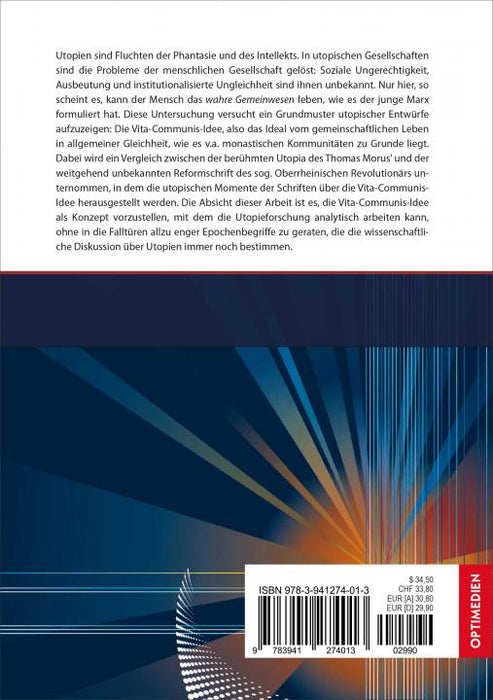The Vita Communis Idea as a Basic Pattern of Utopian Thinking? | 2nd Edition
- Brand: Dümling, Sebastian
- Availability: In stock
- SKU: 9783941274013_2Aufl
€19,90
€28,00
Utopia is a flight of imagination and intellect. In utopian societies, the problems of human society are solved: social injustice, exploitation and institutionalized inequality are unknown to them. Only here, it seems, can man live the true community, as formulated by the young Marx. This study tries to show a...
Utopia is a flight of imagination and intellect. In utopian societies, the problems of human society are solved: social injustice, exploitation and institutionalized inequality are unknown to them. Only here, it seems, can man live the true community, as formulated by the young Marx.
This study tries to show a basic pattern of utopian designs: the vita communis idea, i.e. the ideal of communal life in general equality, as it is the basis of monastic communities in particular. A comparison is made between the famous Utopia of Thomas More and the largely unknown reform writings of the so-called Upper Rhine Revolutionaries, in which the utopian aspects of the writings about the Vita Communis idea are highlighted. The intention of this work is to present the vita communis idea as a concept with which utopia research can work analytically without falling into the trapdoors of overly narrow epochal concepts that still determine the scholarly discussion of utopias.
Details
- Title: The Vita Communis idea as a basic pattern of utopian thinking?
- Subtitle: An investigation of Thomas More's utopia and the reform text of the so-called Upper Rhine Revolutionary
- Author: Sebastian Dümling
- Edition: 2nd edition
- University: Georg-August University of Göttingen
- Released: 07/25/2007
- Department: Philosophy
- Product Type: Book (Hardcover)
- Product type: Master's thesis
- Language: German
- Binding: Softcover (paperback)
- Dimensions: 21.0 x 14.8 cm (DIN A5)
- Scope: 151 pages
- Condition: New
- Keywords: Chiliasm, epoch imaginations, More, Upper Rhine revolutionary, reform biblicalism, reform writing, late Middle Ages, utopia, utopia research, utopias, utopian thinking, Vita Communis
Author
Sebastian Dümling. Born 1981 in Hamburg; 2003-2009 Studies in Medieval and Modern History, Cultural Anthropology/European Ethnology, Philosophy and Political Science in Göttingen/Vienna; 01/2005-10/2005 Editorial work on the journal Historische Anthropologie with Prof. Dr. Hans Medick at the Max Planck Institute for History in Göttingen; since 04/01/09 scholarship holder of the Graduate College Expert Cultures of the 12th bis. 16th century" in Göttingen.
Table of Contents
1. Introduction 2. Basics
2.1 The idea of the Vita Communis:
2.2 Utopia and utopian thinking: history, positions and questions of utopia research
3. Thomas More: Utopia – the best of all states
3.1 Author and work:
3.2 Text analysis I: The Vita Communis idea as a basic pattern of utopia
3.2.1 The island of Utopia a monastery?
3.2 .2 The utopian environment: family, work, communal meal
3.2.3 Sinful private property in More's utopia: the source of all evil
3.3 Interim conclusion I:
4. The Upper Rhine Revolutionary and "the book with 100 chapters and xxxx statutes"
4.1 The author:
4.2 The situation of transmission:
4.3 The book with the hundred chapters and 40 statutes: work character, form and content
4.4 Reform as a utopia: the vita communis idea as a basic model?
4.4.1 The Trier Urreich: an original German community?
4.4.2 “Community” as the highest sense of the community: utopian design or realpolitik program?
4.4.3 Chiliastics or utopia: The path to the realm of equality
4.5 Interim conclusion II: Hermeneutical questions and results Conclusion
5. Closing
References
Bibliography
Download
DRM: Digital Watermark
This eBook contains a digital watermark and is therefore personalized for you. If the eBook is passed on to third parties abusively, it is possible to trace it back to the source.
File format: PDF (Portable Document Format)
With a fixed page layout, the PDF is particularly suitable for specialist books with columns, tables and figures. A PDF can be displayed on almost all devices, but is only suitable to a limited extent for small displays (smartphone, e-reader).
System requirements:
PC/Mac: You can read this eBook with a PC or Mac. You need a PDF viewer - e.g. Adobe Reader.
eReader: This eBook can be read with (almost) all eBook readers. However, it is not compatible with the Amazon Kindle.
Smartphone/Tablet: Whether Apple or Android, you can read this eBook. You need a PDF viewer - e.g. Adobe Reader.
Buying eBooks from abroad
For tax law reasons we can sell eBooks just within Germany and Switzerland. Regrettably we cannot fulfill eBook orders from other countries.



